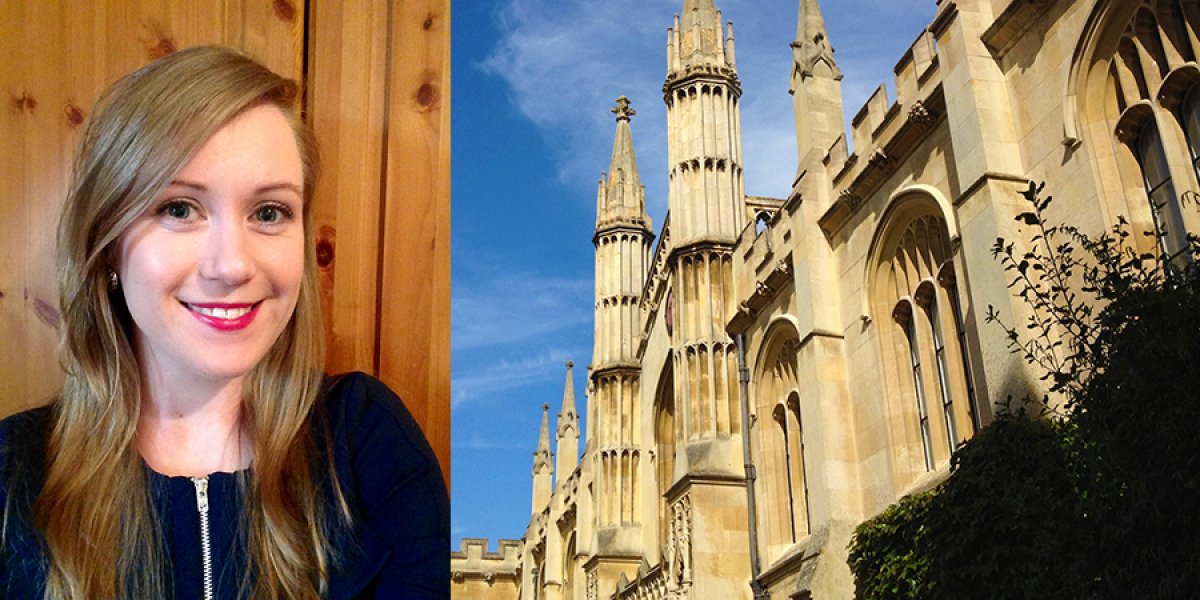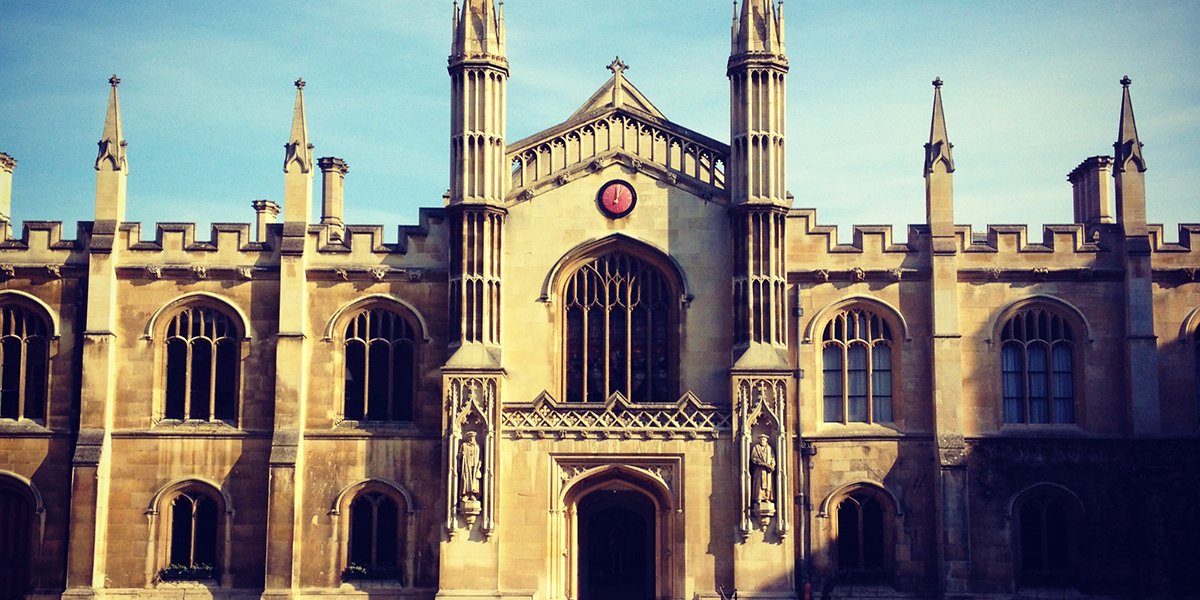A room of my own - Katie Paddock
Going to university was something Katie Paddock (Corpus 2006) had never even considered until, encouraged by the enthusiasm of her Head of Sixth Form, she submitted an application and held her breath.
I can’t imagine being the person I am, in the position that I’m in, without the opportunities, experiences, and support I received whilst at Cambridge.
The concept of university was a distant and alien one to my family and me. I attended a distinctly average comprehensive school, the same one my parents had attended. There was an implicit assumption I’d always stay in the West Midlands and ‘do well’ in a job; careers weren’t for people like us. Whilst I remain grateful for the sacrifices my parents made for me, I knew I wanted something else, and something more.
Fitting in
The new Head of Sixth Form, a fabulously straight-talking woman with a penchant for neckerchiefs, suggested I apply to Cambridge or Oxford. She banged her drum of social mobility and equal access, and, encouraged by her contagious enthusiasm, I submitted an application for Social and Political Sciences (SPS) to Corpus Christi. My confidence waxed and waned. It was difficult not to be taken in by often-negative representations of Cambridge and Oxford students. I was concerned that I wasn’t smart enough, rich enough, or posh enough to be offered a place or even if I would fit in.
Cars and cigars
With my parents unable to accompany me to the interview, the Deputy Head of Sixth Form drove me down with her infant daughter and a school friend. We were all nervous; muffling our anxieties with loud music and brash conversation. Then, Cambridge. It was beautiful, historical, and an absolute nightmare to park. Upon entering Corpus, the baby aggressively, theatrically, soiled herself. My companions took that as their cue to leave.
I had two interviews, but for brevity, will focus on the second. It was towards the end of the day, in an older part of the College. The office was halfway up a set of poorly lit, winding stairs. The imposing mahogany door was set back in to the wall, and I hid in the little alcove until called inside. I was greeted by a small, dark office; a tiny window barely noticeable in the far corner, obscured by books and papers that also littered the floor. The hot air and heavy smell of cigarettes made me dizzy. Dr Gerard Duveen was sat behind his computer, and ushered me inside.
De Beauvoir, Descartes, des rues pavées
Dr Duveen’s speech was often punctuated with long pauses, which I interpreted as disdain, prompting me to awkwardly fill the silence. Questions focused on my UCAS application and personal statement. Why Cambridge? Why SPS? He asked about the books I’d read in my spare time. I mentioned Simone de Beauvoir in light of my interests in feminism, and pronounced Descartes phonetically (which I didn’t realise until months later). He respectfully asked why I should be accepted over someone with better-predicted grades, from a better school. I ranted for twenty minutes, politely unleashing my pent-up angst, frustrated by the stifling heat of the smoky room, and speaking with the surety that I was about to die like a dog in a hot car. Pause. But forget social mobility, I really just wanted to cycle down the cobbled streets with a Yorkshire terrier in my wicker basket before going punting.
A consolation prize?
Towards the end of the interview, Dr Duveen asked whether I had read anything by Virginia Woolf, I hadn’t, and he then discussed A Room of One’s Own. I nodded, wide-eyed and enthusiastic, eager to learn, eager to show him that I wasn’t a complete div for having not read Virginia Woolf. Darkness gradually drew in through the tiny window. We had been talking for over an hour and a half. It was actually really nice.
A couple of weeks later, a package arrived. In it was a letter from Dr Duveen stating that he enjoyed meeting me, hoped the interview went well, that he recalled mentioning A Room of One’s Own, and enclosed was a copy. I was amazed and deeply touched, but also suspicious of whether this was an indication of my successful application, or a wonderful consolation prize. Some time later, I received my letter of provisional acceptance.
Unfortunately, shortly after that, my parents’ marriage dissolved and my mother and I were living in a one bedroom flat above a penny arcade. It was behind a supermarket that received numerous early-morning deliveries, and our fire alarm broke constantly; its piercing shriek punctuated by the sounds of revellers outside. Exam revision was difficult. Somewhat ironically, I read A Room of One’s Own as my mother slept beside me.
The wave of realisation
Then came freshers' week. A wave of realisation: people are generally lovely. Even those that had comparatively privileged backgrounds didn’t mock me because my dad’s a bus driver or I’d never eaten salmon before. A PhD student took me under his wing and provided coffee, plenty of cake, and a supportive ear whenever I was stressed, and some fabulous friends organised a holiday to Ireland for my first excursion outside the UK. Consequently, my first passport photo is reminiscent of a chubby thumb with eyes. Everyone at Corpus was very supportive. Dr Duveen and others worked to ease my 'imposter syndrome', and I received extra tuition after struggling to compose essays, without being made to feel like a failure.
A room of one's own
Around 2007, Dr Duveen was diagnosed with cancer, and he quickly deteriorated. I visited the palliative hospice, armed with flowers from my fellow SPSers, intending to drop the flowers off and leave so as not to impose. The nurse said he would like to see me. He cheerfully greeted me and gave thanks for the gifts. We paused. “So how are you doing?”, I asked. Excellent on-brand awkwardness, Paddock. He saw the funny side, and joked about his own mortality. Dr Duveen told me that he knew I’d do well, and not to let my insecurities distract me. I mumbled my thanks and left. He died on my 21st birthday.
My three years were stressful, but ultimately, incredibly rewarding. I can’t imagine being the person I am, in the position that I’m in, without the opportunities, experiences, and support I received whilst at Cambridge. I have a PhD. I have a career. I have a room of my own.
Katie has an BA in Social and Political Sciences. She attended Corpus Christi College. She is currently a research associate for the School of Nursing, Midwifery and Social Work at the University of Manchester.
If you would like to submit your own alumni story, send us an email for details of our submission guidelines.
This article has been written by Katie Paddock and the opinions expressed are those of the author.

